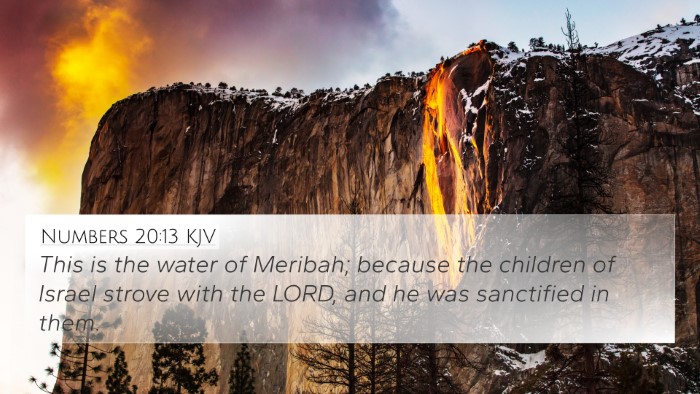Understanding Deuteronomy 6:16
Verse: Deuteronomy 6:16 states, "You shall not put the LORD your God to the test, as you tested Him at Massah."
General Meaning
This verse emphasizes the importance of faith and trust in God rather than testing His responses or capabilities. The context of this scripture highlights Israel's history in the wilderness, where they questioned God's provision and presence.
Insights from Commentaries
- Matthew Henry:
Henry discusses the nature of testing God as an act rooted in doubt and unbelief. He emphasizes that God's grace should lead us to trust without demanding signs or confirmations.
- Albert Barnes:
Barnes points out that testing God reflects a lack of faith. He notes that the Israelites' actions at Massah serve as an example of how one should not behave—believers are encouraged to affirm their trust in God's promises without requiring external proofs.
- Adam Clarke:
Clarke elaborates on the significance of not putting God to the test, suggesting that it denotes an attitude of rebellion and ingratitude. He stresses how the act of testing reveals a heart not fully committed to God’s will and word.
Historical Context
This passage refers to an event at Massah where the Israelites doubted God's ability to provide water, which is seen as a critical failure in their journey of faith. It captures a moment where their insistence on seeing miraculous signs led to severe repercussions.
Cross-References
Deuteronomy 6:16 finds its resonance and thematic parallels in several other scripture passages that lay emphasis on faith and true trust in God's character:
- Exodus 17:7 - The account of the Israelites at Massah, where they questioned God’s presence and capability.
- Matthew 4:7 - Jesus responds to temptation, emphasizing not to put God to the test.
- Luke 4:12 - Similar to Matthew, reinforcing the command against testing the Lord.
- 1 Corinthians 10:9 - A warning against tempting Christ, recalling the history of Israel in the wilderness.
- Hebrews 3:8 - Encouraging believers to not harden their hearts as the Israelites did in the desert.
- Psalms 78:18-19 - A reflection on how the Israelites tempted God by asking for signs.
- Psalms 95:9 - A reminder of the testing of God in the wilderness and the harrowing consequences of such actions.
Thematic Connections
This verse embodies themes of faith, obedience, and the transcendence of God. By cross-referencing related verses, a clearer picture emerges of the expectations placed upon believers to trust in God's wisdom rather than seek signs:
- Bible verse cross-references strengthen our understanding of similar themes found in scripture.
- Connections between Bible verses reveal a tapestry of God's faithfulness depicted throughout both the Old and New Testaments.
- Linking Bible scriptures provides insights into God's consistent nature and the repeated call for His people to trust Him wholeheartedly.
- Comparative Bible verse analysis helps identify how different authors of the Bible understood and articulated faith in God.
- Bible verses that relate to each other enhance our study through scriptural cross-referencing, leading to a profound understanding of God's message.
- Exploring thematic Bible verse connections, like between faith and obedience, provides a rich foundation for personal growth.
Application for Believers
Deuteronomy 6:16 serves as a crucial reminder for believers in various contexts of life. It encourages believers to:
- Trust in God: Understanding that faith is without conditions; believers are called to trust in God's goodness and provision.
- Avoid Doubt: Recognizing that questioning the ability of God can lead to spiritual stagnation and missed opportunities for growth.
- Affirm Faithfulness: Recalling moments of God’s past provision and miracles to encourage faith in present circumstances.
Resources for Study
For those seeking to deepen their understanding through cross-references and related materials:
- Tools for Bible Cross-Referencing: Utilizing a Bible concordance or cross-reference Bible study guides for effective exploration.
- How to Use Bible Cross-References: Learning methods to connect verses enriches any study, sermon preparation, or personal devotion.
- Identifying Connections: Use Bible chain references to find thematic connections between the Old and New Testament.
- Bible Reference Resources: Accessing comprehensive materials helps in creating a structured approach to biblical studies.
Conclusion
Deuteronomy 6:16 is a profound reflection on the nature of faith and the danger of testing God. By cross-referencing this verse with others, a believer can fully appreciate the consistent call to trust in God's unchanging character across scripture. This encourages spiritual integrity and promotes a deep, abiding relationship with God, grounded in faith rather than a demand for signs.












